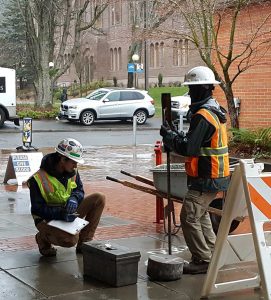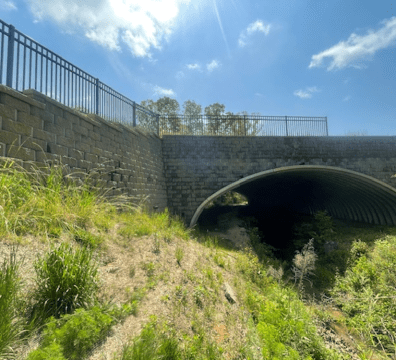What Are Geotechnical-CMT Services?
Geotechnical-CMT services encompass two main areas:
Geotechnical Engineering: This branch of engineering involves the study of soil and rock behavior, subsurface conditions, and how these factors affect the design and stability of man-made structures. Common activities include soil compaction testing, foundation analysis, and slope stability assessments.
Construction Materials Testing (CMT): CMT is a quality control process that tests the materials used in construction projects to ensure they meet required standards. It includes testing soil, concrete, asphalt, and other materials to determine their strength, durability, and performance.
Both components are crucial for ensuring that a construction project is structurally sound and built to last.
The Importance of Geotechnical Evaluations for Developers
Mitigating Risks Early
Geotechnical evaluations help developers and municipalities identify potential risks before construction begins. These evaluations assess soil composition, groundwater levels, and other subsurface conditions that may pose challenges to the structural integrity of the project.
By identifying these issues early, developers can make informed decisions regarding foundation design and construction methods to mitigate risks such as settlement, erosion, or collapse.
Ensuring Compliance with Regulations
Geotechnical-CMT services are also essential for meeting regulatory requirements. Local, state, and federal agencies have strict guidelines governing soil stability, erosion control, and the quality of construction materials. Compliance with these regulations ensures that projects are built safely and sustainably, reducing the risk of delays or fines due to non-compliance.
Construction Materials Testing (CMT): Why It Matters
Building Confidence in the Materials Used
Construction Materials Testing (CMT) ensures that the materials used in a project meet the necessary standards for strength, durability, and overall performance.
This is particularly important in large-scale projects where material failures can lead to structural problems, increased maintenance costs, or safety concerns. CMT is performed on various materials, such as concrete, soil, and asphalt, to verify their suitability for the project.
Types of Materials Tested in CMT
CMT services cover a wide range of materials used in construction, including:
- Soil: Soil compaction testing ensures that the ground is stable enough to support the structure. Poor soil compaction can lead to settling and structural failure.
- Concrete: Concrete is tested for its compressive strength to ensure it can support the intended loads. If the concrete is too weak, it can crack or fail under pressure.
- Asphalt: For roadway projects, asphalt is tested to ensure proper compaction and performance under traffic loads. Poorly compacted asphalt can lead to early deterioration and costly repairs.
- Reinforced Steel: CMT ensures that the steel used in reinforced concrete structures meets the required standards for strength and flexibility.
Geotechnical-CMT Services in Various Projects
Residential Subdivisions
 In residential subdivisions, geotechnical-CMT services are essential for ensuring that homes are built on stable foundations. Soil conditions, drainage, and foundation design are carefully assessed to avoid issues like settling or soil expansion, which can cause long-term structural damage.
In residential subdivisions, geotechnical-CMT services are essential for ensuring that homes are built on stable foundations. Soil conditions, drainage, and foundation design are carefully assessed to avoid issues like settling or soil expansion, which can cause long-term structural damage.
Commercial Developments
Commercial projects, such as office buildings and warehouses, place heavier demands on geotechnical evaluations and materials testing due to the larger structures and heavier loads they must support.
Geotechnical-CMT services help ensure that the foundation and materials used can withstand these stresses over time, reducing the risk of structural failure or costly repairs.
Infrastructure Projects
For infrastructure projects such as bridges, roads, and highways, geotechnical-CMT services play a critical role in ensuring long-term durability and safety.
Soil compaction and asphalt performance are key factors in the longevity of roadways, while concrete strength testing is crucial for bridge construction.
Why Developers and Municipalities Need Geotechnical-CMT Services
Geotechnical-CMT services provide essential support for both developers and municipalities by ensuring that construction projects are built safely, efficiently, and in compliance with regulations. These services offer the following benefits:
Cost Savings in the Long Run
By investing in geotechnical-CMT services early in a project, developers can avoid costly issues down the line. Identifying soil or material issues before construction begins helps prevent expensive repairs, project delays, and legal liabilities. These services are an investment in the long-term success of the project.
Long-Term Durability and Safety
The ultimate goal of geotechnical-CMT services is to ensure that structures are safe, durable, and able to withstand environmental and operational stresses over time.
Whether it’s a residential home, a commercial building, or public infrastructure, ensuring long-term stability is key to minimizing maintenance costs and extending the lifespan of the project.
The Value of Geotechnical-CMT Services
Geotechnical-CMT services are a critical component of any successful construction project. By addressing both the subsurface conditions and the quality of materials used, these services help ensure that structures are built to last.
They provide developers and municipalities with the assurance that projects are compliant with regulations, safe for occupants, and sustainable over the long term.
For developers and municipalities looking to build reliable, stable, and durable structures, geotechnical-CMT services are an indispensable part of the construction process.
With a combination of thorough geotechnical evaluations and rigorous materials testing, these services help mitigate risks, ensure compliance, and provide a solid foundation for project success.


 In residential subdivisions, geotechnical-CMT services are essential for ensuring that homes are built on stable foundations. Soil conditions, drainage, and foundation design are carefully assessed to avoid issues like settling or soil expansion, which can cause long-term structural damage.
In residential subdivisions, geotechnical-CMT services are essential for ensuring that homes are built on stable foundations. Soil conditions, drainage, and foundation design are carefully assessed to avoid issues like settling or soil expansion, which can cause long-term structural damage.